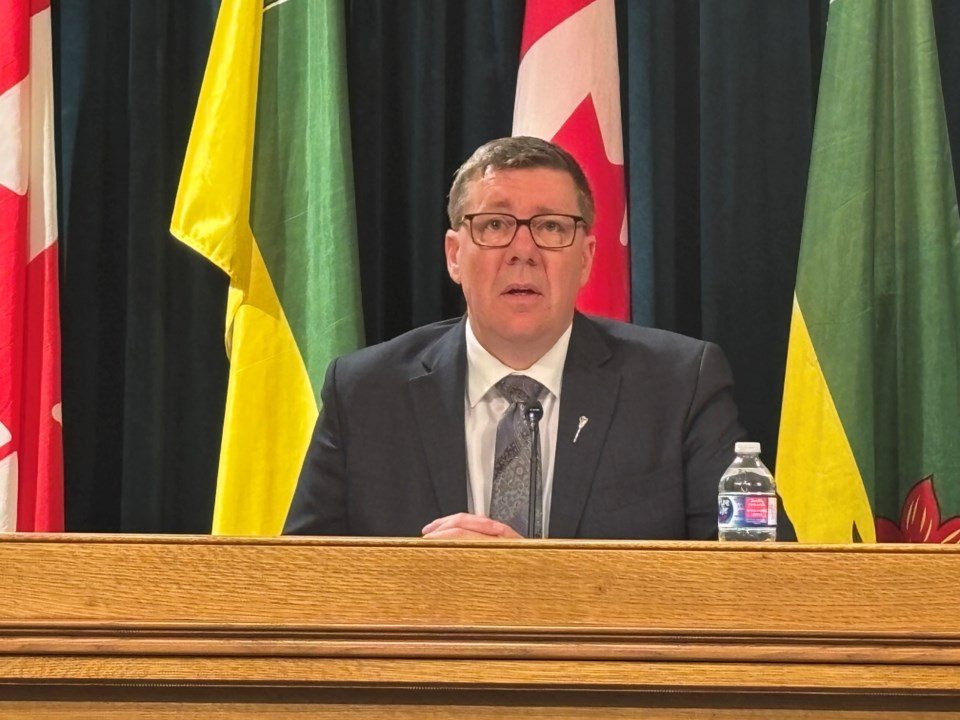HUNTSVILLE, ONT. - Premier Scott Moe is coming back from what he sees as a productive Council of the Federation meeting in the Muskoka region of Ontario, hoping it leads to further progress on tariff and trades issues.
Speaking in a conference call with reporters Wednesday afternoon, Moe said there were good discussions about international trade and “how we are finding our way to what hopefully would be a low barrier, low tariff, zero tariff ideally environment as we trade and export to our largest trading partner.”
He also said their discussions touched on “some of the engagement that the federal government is making not only with the United States of America but also with countries like China,” from which Saskatchewan has felt an impact from canola tariffs.
“Rest assured that the federal government is being informed, the federal government continues to engage with China, and we're supporting them every step of the way whether it be through our trade office or through the historical engagement that we have had with that country and many others.”
Moe said there was also a good discussion on internal trade, and issues such as labour mobility. One of the issues that came up was whether all the other Premiers should join the Western premiers in signing the New West Partnership Trade Agreement already in place.
“This was really a part of a discussion that we had at the table around: should we replace the Canada Free Trade Act with something like the New West Partnership, that goes further and really is the gold standard for trade in across Canada.”
He said it was felt the New West Partnership is a more expansive agreement and covers more topics — with a dispute mechanism and it has a number of other nuances, such as corporations certifying in one province being automatically certified in other provinces as well.”
Moe said that after some discussion, what the Premiers had decided to do is “start to add chapters and continue to add streamlined opportunities” in the broader Canada Free Trade Agreement, “looking at the New West Partnership as a model for that.”
He noted the Western provinces through the New West Partnership are “ahead of the rest of Canada when it comes to free and liberalized trade, and so we'll continue to do that in the West and we'll continue to push all of the other provinces to… expand the CFTA to make it as close to a mirror image as we can to the New West Partnership, and if we can even go beyond what we have in our western Canadian agreement, that's good, too.”
There was also talk about the need for a workable regulatory environment. Moe said the introduction and passing of Bill C-5, which he said is a “piece of legislation that is specifically designed to to cut through an unworkable regulatory process that we have in Canada,” is speaking to “the broader effort that we all need to make in fixing the regulatory process that we have.”
“And so we had some discussions about what that might look like with respect to approving projects in short term through Bill C-5 and working together to fix that regulatory process moving forward so that the investment attraction can happen for years and decades into the future.”
There has also been a flurry of interprovincial signings this week including ones on interprovincial trade with PEI and Manitoba. Moe was also asked about Saskatchewan signing an MOU with Manitoba on the corridor to Port of Churchill.
Moe said this builds on “the language that came out of the Western conference on a port-to-port corridor opening up Asian and European markets.”
That MOU was an intent of both provinces, Moe said, to “support all of the private sector” and the communities involved. “It would be my hope and I think it'll happen in the very short term that you see a federal government that would be very much strongly in favor of advancing this port-to-port corridor concept and it really can open up opportunities for many many industries in western Canada across the four provinces and I would say benefit the rest of Canada as well.”



.png;w=120;h=80;mode=crop)
